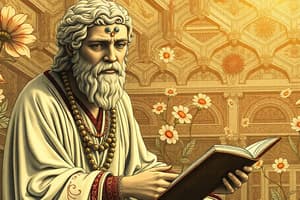Podcast
Questions and Answers
According to ancient Greek philosophers, what is man considered to be?
According to ancient Greek philosophers, what is man considered to be?
- A divine being
- A god in disguise
- An angelic being
- A microcosm (correct)
What did Leucippus & Democritus coin in philosophy?
What did Leucippus & Democritus coin in philosophy?
- Theory of Metaphysics
- Principle of Cosmology
- Theodicy principle
- The concept of atomism (correct)
What aspect of reality does Metaphysics investigate?
What aspect of reality does Metaphysics investigate?
- The nature of God
- The physical world only
- The fundamental nature of reality and existence (correct)
- The laws governing the universe
What question does Cosmology seek to answer?
What question does Cosmology seek to answer?
What is the main focus of Theodicy in philosophy?
What is the main focus of Theodicy in philosophy?
According to atomists, what are atoms composed of?
According to atomists, what are atoms composed of?
What is the material cause according to Aristotle's Four Causes?
What is the material cause according to Aristotle's Four Causes?
Which philosophical period was characterized as Cosmo-centric?
Which philosophical period was characterized as Cosmo-centric?
What does philosophy focus on, according to the text?
What does philosophy focus on, according to the text?
Who is known as a prominent figure in the Anthropocentric period of philosophy?
Who is known as a prominent figure in the Anthropocentric period of philosophy?
What marks the transition from philosophy to theology?
What marks the transition from philosophy to theology?
During which ancient period did Socratic philosophers like Thales and Pythagoras exist?
During which ancient period did Socratic philosophers like Thales and Pythagoras exist?
What did Socrates say is the feeling of a philosopher?
What did Socrates say is the feeling of a philosopher?
Which type of knowledge is considered the lowest kind?
Which type of knowledge is considered the lowest kind?
What does the term 'Philosophy' mean when broken down to its roots?
What does the term 'Philosophy' mean when broken down to its roots?
Intellectual pursuit in Philosophy is primarily focused on:
Intellectual pursuit in Philosophy is primarily focused on:
Which Greek philosopher and mathematician was the first to use the term 'Philosophy'?
Which Greek philosopher and mathematician was the first to use the term 'Philosophy'?
Flashcards
Starting point of philosophy
Starting point of philosophy
Inquisitive nature leads to questioning and critical thinking.
Philia
Philia
Love that seeks unity and possession of the the object.
Sophia
Sophia
The good exercise or application of knowledge.
Doxa or Opinion
Doxa or Opinion
Signup and view all the flashcards
Episteme or Scientific Knowledge
Episteme or Scientific Knowledge
Signup and view all the flashcards
Techne or Technical Knowledge
Techne or Technical Knowledge
Signup and view all the flashcards
Leucippus and Democritus
Leucippus and Democritus
Signup and view all the flashcards
Metaphysics
Metaphysics
Signup and view all the flashcards
Cosmology
Cosmology
Signup and view all the flashcards
Theodicy
Theodicy
Signup and view all the flashcards
Aristotle's Material Cause
Aristotle's Material Cause
Signup and view all the flashcards
Aristotle's Efficient Cause
Aristotle's Efficient Cause
Signup and view all the flashcards
Aristotle's Formal Cause
Aristotle's Formal Cause
Signup and view all the flashcards
Aristotle's Final Cause
Aristotle's Final Cause
Signup and view all the flashcards
Definition of Philosophy
Definition of Philosophy
Signup and view all the flashcards
Ancient Period (Cosmo-centric)
Ancient Period (Cosmo-centric)
Signup and view all the flashcards
Medieval Period (Theo-centric)
Medieval Period (Theo-centric)
Signup and view all the flashcards
Study Notes
Introduction to Philosophy
- Human beings are naturally inquisitive, and philosophy starts with wonder, which leads to questioning and critical thinking.
- Philosophy is about questioning and seeking answers, not just finding answers.
Philia and Sophia
- Philia means love, which seeks unity with the object and desires to possess it.
- Sophia means wisdom, which is the good exercise or application of knowledge.
- Philosophy is the love of wisdom, seeking truth and unity with the object of knowledge.
Different Forms of Knowledge
- Doxa or Opinion: common understanding or common sense, lacks proper justification.
- Episteme or Scientific Knowledge: grounded or justified assertions, proven by scientific method.
- Techne or Technical Knowledge: practical expertise or skill.
- Sophia or Wisdom: good exercise or application of knowledge.
Ancient Greek Philosophers
- Pythagoras coined the term "philosophy".
- Leucippus and Democritus: atomists who believed matter is composed of tiny, imperceptible, indivisible, eternal, and uncreated atoms.
- Ancient Greeks understood man in the context of the world, as a microcosm.
Branches of Philosophy
Metaphysics
- Investigates the fundamental nature of reality, being, and existence.
- Deals with questions about the non-physical world and reality.
Cosmology
- Study of the universe, its origin, dynamics, and laws that govern its order.
- Known as the "theory of the universe".
Theodicy
- Studies the nature, being, goodness, and justice of God in the light of reason alone.
- Examines God and man's relationship and other doctrines related to divinity.
Aristotle's Four Causes
- Material Cause: the material out of which the thing exists.
- Efficient Cause: the mover that causes the thing to be or happen.
- Formal Cause: the form in which the thing is arranged.
- Final Cause: the purpose for which the thing exists.
Definition of Philosophy
- Philosophy is the science of all things or beings in their ultimate causes or principles acquired by the natural light of reason alone.
Brief History of Philosophy
- Ancient Period (600-300AD): Cosmo-centric, thinkers like Thales, Pythagoras, and Socratic philosophers.
- Medieval Period (300-1400AD): Theo-centric, thinkers like St. Anselm, Aquinas, and St. Augustine.
- Modern Period (1500-1800AD): Anthropocentric, thinkers like René Descartes, John Locke, and Karl Marx.
- Contemporary Period (1900-present): Analytic Philosophy, focusing on language and natural sciences, with thinkers like Leo Tolstoy, Friedrich Nietzsche, and Edmund Husserl.
Studying That Suits You
Use AI to generate personalized quizzes and flashcards to suit your learning preferences.




